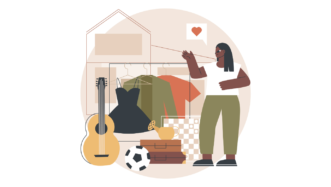LESSON OVERVIEW
In this ESL lesson about body language, students learn some phrases to describe gestures and movements and talk about body language in different situations.
B1 / Intermediate60 minStandard LessonFree / Premium Plan
WARM-UP & VOCABULARY
This ESL lesson about body language starts with a warm-up activity. Students look at the pictures of people and say what they are feeling and explain their ideas. Then, students move on to a vocabulary activity and discuss different sentences (e.g. If you nod your head, it means you agree.) that contain key vocabulary (e.g. nod your head, roll your eyes, etc.). They decide if the statements are true in their culture. Students can also show the gestures and movements from the exercise to understand and remember the phrases better. After that, the teacher asks students whether they know who a body language detective is. Then, they read three conversations with a body language detective and choose the correct phrases.
MORE VOCABULARY PRACTICE & SPEAKING
This part of the ESL lesson about body language continues with a discussion of students’ experience with reading body language and its importance. Students do some activities that are connected to the three conversations they read before. First, students look at the pictures and match them to the characters from the dialogues. Then, students try to interpret the body language of these people. There are useful phrases available to students that they can use in their discussion. Students also read two anecdotes about misunderstanding body language and guess the endings. After that, they talk about the anecdotes and share if they had similar experiences. The lesson wraps up with a discussion activity where students talk about different situations and how body language helps in each of them.
HOMEWORK/REVISION
The ESL lesson about body language includes a supplementary task to practise the phrases from the lesson. The task is available in the teacher’s version of the worksheet and can be printed for students or accessed in the e-lesson plan for online teaching.
WORKSHEETS














Thanks a lot !! Wonderful lesson !! You did help me a lot!!
Thank you so much for your feedback! We’re happy you liked it 🙂
I’ve just found this website and oh my god how come I hadn’t hear about it before? It’s an amazing site for teacher, guys! Congrats!
Welcome to ESL Brains, Ana! Wish you many awesome lessons with ESL Brains materials 🙂
Thanks a lot for this useful material!! It’s a huge help!
Thank you so much for your feedback! We’re happy you liked this lesson 🙂